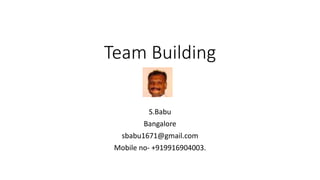This document provides information about team building. It defines what a team is as a group of people united to achieve common objectives and purposes. It discusses why teams are needed for goals accomplishment, productivity, planning, conflict resolution, and commitment. It describes the strengths of teams as the alignment between individual and organizational values and goals. It outlines stages of group development and roles of group members. It lists characteristics of effective teamwork like participation, openness, collaboration, and commitment. It defines team building as empowering individuals to enhance team performance through developing interpersonal skills and relationships. It discusses the focus of team building on tasks, goals, and relationships. It outlines benefits of team building to team members, leaders, and organizations.





















